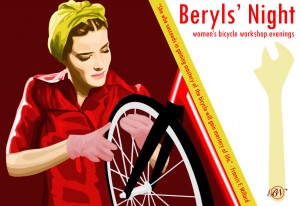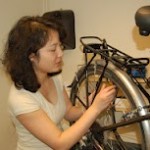It’s long been my mantra that the best ways I know to live cheap are 1) packed lunches and 2) riding a bike. Its my experience that every cyclist, especially those of us who live by our bikes and find it difficult to conceive of other ways of getting to work, to the pub, out to the country and just about anywhere are, at some point, going need to know how to fix them. Its not mountain biking or road racing that knackers a bike its the dirty gritty city roads. Its the daily grind, the workhorse not the weekend bike that takes a beating. Its sitting outside in the cold weather and being clipped by cars, propped up against railings outside pubs that leads to wear and tear. And its the inability to be parted from our bikes, even for a few days in the workshop, that allows them to go to rack and ruin. This is totally understandable but it means that every cyclist who does not have money to throw at their bike related problems (which is all of us at the minute – right?) needs to be a mechanic as well. This is a great thing, is an impetus to unleash your inner mechanic! If that sounds daunting, here a few pointers to get you started:
1.Take a class
I am of the opinion that everyone can be a mechanic. If you tell yourself you not ‘mechanically-minded’ you’ve lost before you’ve even started. If such a thing as mechanical-mindedness exists, these people are very lucky most of us simply need practice and patience. Approach it like you would anything new, get some instruction (there is no shame in it – really!). There are more and more courses offered by all kinds of organisations ranging from a few days intro for £60-100 to a full-blown profession qualification which will set you back a grand. Start with an ‘intro’ course, if you get into it you can do something more advanced, never fear repeating the same material you’ve already covered on an earlier course – you literally cannot repeat stuff enough its the best way to get your head round it. Opt for independent workshops and bike coops especially those which will offer you access to their space once the course is completed. I have made a (far from definitive) list of these places at the bottom of the page.
2.Join a DIY workshop
This is the key. Once you’ve done a course, unless your a secret millionaire, your not going to be able rush out and buy all the tools you need to start home mechanic-ing. So you gotta find a bike stand, tools, access to parts old and new and comradary/support for those tricky moments. Thats why you need to find a DIY bike workshop near you. Many of these exist to educate people about bikes, enable shared ownership of resources and bring people together around cycling. So support them, don’t faff about getting frustrated in a dark cold garden/garage by yourself, become a member and step into the light…workshop. Some even have women’s nights. (again see list below)
3.Get a guide book: I went through a few before I found one I got on with but when I did it was my absolute security blanket until I gained the experience to out grow it. The internets good and that, you can find literally reams of info on Sheldon Brown’s website but if you are like me a get along better with a proper instructional manual you can take into the workshop I recommend Chainbreakers bike book unreservedly. Its not only easy to follow and covers pretty much everything for the amateur mechanic, its got politics! Its non-commercial, feminist, recycle and reuse message, not to mention the radical New Orleans bike zine reprinted in the back are like chicken soup for the soul of any cyclist who sees bikes and DIY as part of making our material world a bit more authentic. There are others of course so, in order of worth havingness: Park Tool Big Blue Bike Book: lots of pictures but it is just a big advert of Park Tool, Zinn and the art of road bike maintenance, Zinn and the art of mountain bike maintenance: these are very detailed and probably not the best when just starting out, Haynes bike book is very basic and I don’t really rate it. Feel free to add your own reviews to this.
Well hope thats helpful. Lets get to it.
a list of DIY bike spaces offering tool clubs, cycle groups, courses and even bike ballet:
London
56A bikeroom
London Bike Kitchen
Oxford
Oxford Cycle Workshop Training
Women only session Beryls’ Night Wednesdays fortnightly.
Bristol
Bristol Bike Project
BBP women’s night
Kebele Community Coop bike workshop
Birmingham
Birmingham Bike Foundry
Leeds
Pedallers Arms, with monthly women and trans drop-in session
Manchester
I Bike MCR
Newcastle
Recphy yer bike





Although I am male (don’t ask me how I got onto this site), I would like to query this statement:
“Once you’ve done a course, unless you['re] a secret millionaire, your not going to be able rush out and buy all the tools you need to start home mechanic-ing.”
Sure, tools can be pricy if you decide to buy all of them in one go, but this is over the top don’t you think?
I now own most bike repair tools, and have even bought rudeminetary bike tool kits for other friends as birthday presents, etc… All this on a fairly average salary too.
Hi Spokeswomen, 6 job vacancies have just been advertised at Islabikes THE children’s bikes specialists – in both workshop and customer services – visit: http://www.islabikes.co.uk/infohub/infohub-careers.html
Fantastic opportunity and a great place to work.
Liz.